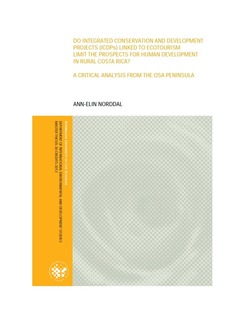| dc.description.abstract | The overall objective in this Master Thesis is to assess the impact of ecotourism as Integrated Conservation and Development Projects (ICDPs) implemented by international and national environmental non-governmental organizations (NGOs) on the Osa Peninsula in Costa Rica. By examining these projects in relation to the overruling policy of the environmental NGOs and their funders, this study aims to find out if ecotourism ICDPs limit the prospects for human development in rural Costa Rica. This research used a mixed-methods approach of both quantitative and qualitative methodologies, and applied critical theories to guide the early stages of the research project. In short, environmental scientists fear that ICDPs fail to achieve conservation goals by focusing too much on development drivers and external factors such as policies, funders and forces of the market. On the other side of the debate, academics within development studies fear the opposite; that conservation goals act as the driving imperative, overruling the prospects for human development. Human development is to a large extent about individual values, and what people and communities ought to value, which means that personal preferences need to be taken into consideration in order to achieve human development. Research findings recognize that ecotourism ICDPs have weaknesses and pitfalls concerning differences in values among the stakeholders, lack of context-specific knowledge and power inequity, where conditions for funding and conservation objectives act as the overruling imperative. Despite of this, positive outcomes have been identified and elaborated. The local majority residing close to the protected natural areas express appreciation for ecotourism, as it provides alternative sources of income and new capabilities. The civil society, through the environmental NGOs, creates a new arena where individuals can serve as political actors, facilitating local empowerment which eliminates threats to both human and environmental security. | no_NO |
